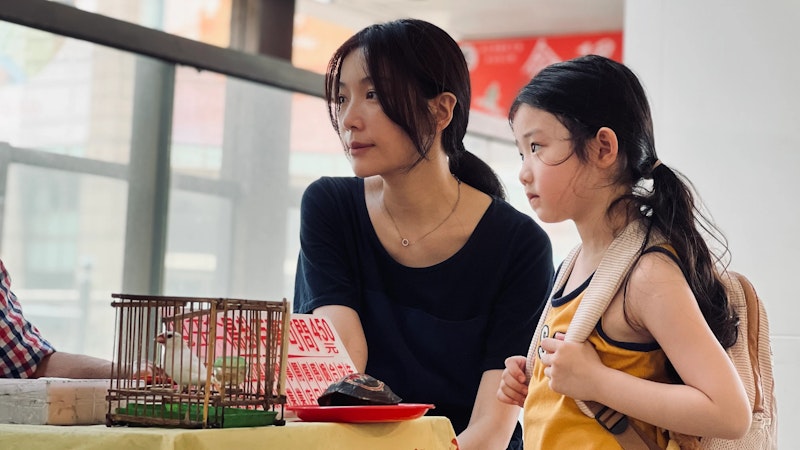The respect for Sean Baker may stem from his curiosity about other cultures, which he’s immersed himself in. His approach is unique because of the valuable collaborators he’s worked alongside who can speak to different worldviews, including the Taiwanese filmmaker Shih-Ching Tsou. Tsou and Baker worked together to direct 2004’s Take Out, a day-in-the-life drama about an undocumented Chinese immigrant in New York City. The merger between Tsou’s knowledge of the migrant experience and Baker’s compassion for impoverished characters resulted in a minor sensation in the indie world that led both filmmakers to bigger and better things.
Take Out was the only entry within Baker’s filmography to have a co-director, and none of his subsequent work would suggest this has been an impediment. While there are many indie filmmakers that’ve attempted to “level up” by working on larger studio ventures, Baker has stayed within the indie world, and narrowed his focus to examine unusual slice-of-life stories. While Tsou served as a producer on The Florida Project and Red Rocket, she made her first film as a solo director with Left-Handed Girl, which Baker helped to fund and distribute.
Tsou has proven herself as a worthy artist in her own right, and Left-Handed Girl doesn’t feel like Baker owed her a favor. Nonetheless, Baker’s name has been prominent within the marketing of Left-Handed Girl, in part due to its stylistic similarities with Take Out. Baker and Tsou are distinct artists whose difference in approach is evident from their solo productions. If Anora was a modernist rendition of Old Hollywood archetypes, then Left-Handed Girl is grounded and observational in a manner that would nearly seem voyeuristic.
Left-Handed Girl is the story of three generations of Taiwanese women who struggle to overcome societal barriers that’ve prevented them from independence. Shu-Fen (Janel Tsai) has spent many years away from Taiwan’s capital city of Taipei, but is forced to return due to unforeseen circumstances that are eventually explained in a somewhat clumsy reveal.
Although Shu-Fen has grown weary of the overbearing presence of her extended family, she’s forced to appease them after the purchase of a food stand intended to be her source of employment. Shu-Fen’s grueling work in the hectic streets is made more challenging by her two daughters, the college-aged I-Ann (Shih-Yuan Ma) and the five-year-old I-Jing (Nina Ye). I-Jing is dazzled by the buzzing, kinetic ebbs and flows of city life, whereas I-Ann can’t help but get herself into trouble.
The most notable quality that differentiates Tsou’s work from Baker’s is their approach to dramatic tension. While Baker films like Red Rocket and Tangerine mounted contrivance upon conflict to bring their protagonists to a breaking point, Tsou spends time within the mundanity of everyday life. The stakes do get raised as Shu-Fen’s secrets are unearthed to her overbearing parents, but they serve as an inevitability, and not a plot twist. Many of the best moments in Left-Handed Girl are dedicated to the daily battles waged by Shu-Fen to make ends meet.
While Left-Handed Girl doesn’t dedicate much time to the mourning of absent paternal figures, the misshapen dynamics of its three main characters are compellingly dysfunctional. I-Ann’s an ally and a burden to her mother; she’s willing to look after I-Jing when Shu-Fen must attend to her business, but is also prone to drinking binges that lead to embarrassing scenarios. It’s a nuanced depiction of the consequential age in which a child has reached adolescence, but isn’t entirely free from their parent’s dominion.
One lesson Tsou presumably learned from Baker was how to pinpoint the perspective of a child who has just reached the age when they can form their own memories. While Baker followed a young Florida mother and her daughter in the backdrop of Florida’s low-rent communities in The Florida Project, Left-Handed Girl is able to examine the cultural diffusion of Taipei through the eyes of I-Jing, who believes the city’s a massive playground. I-Jing’s perspective is well-utilized because the vastly different lessons she’s taught by her sister and mother are an interesting point of comparison; despite often being in defiance of her mother, I-Ann is compelled to give the same advice to I-Jing that Shu-Fen gave to her.
All three lead performances are extraordinary, but Left-Handed Girl should also be considered for the newly-introduced Academy Award category for Best Casting, which will go into effect in next year’s ceremony. Tsou managed to assemble a robust ensemble to play Shu-Fen’s chaotic, bickering relatives, many of whom she’s not entirely sure how she’s related to. Left-Handed Girl’s decision to treat Shu-Fen’s entire extended family as a single entity makes for a representation of the weight of familial expectations.
The title Left-Handed Girl is a reference to a comment made by Shu-Fen’s father, who’s told his youngest granddaughter that being left-handed is the sign of the devil. Subtle comments like these speak to the challenge in defying cultural presumptions, which pile upon younger characters like I-Jing. It’s only in the final third that Left-Handed Girl is transformed into a more operatic melodrama that could be described as “Baker-lite.” Tsou has shown more confidence and resilience than most filmmakers would be capable of with their first solo venture.

